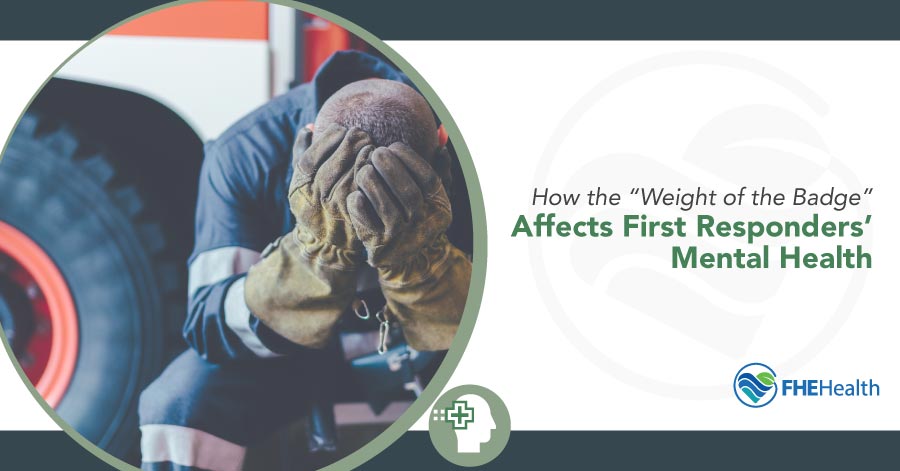
“He swore that oath to protect and serve
Pours his heart and soul into both those words
Lays his life on the line
The line he walks is razor fine
Tempered strength is always tough
But he ain’t gonna buckle
Under the weight of the badge”
-George Strait, Weight of the Badge
In a song that celebrates the dedication and hard work of law enforcement officers, George Strait describes an officer’s commitment to his community and the impact his career has on his personal safety. In the song, Strait sings, “It doesn’t weigh a lot until you put it on, and the weight of it is staggering.”
Most communities are deeply aware of the sacrifice first responders make daily. Not only do first responders give up time with family and a significant measure of personal safety, but many also sacrifice their mental health for the job. While most people shy away from violence, tumultuous domestic situations and trauma, police officers, emergency medical service providers, and firefighters willingly put themselves on the frontline for the sake of their communities.
Being a first responder isn’t a role that’s suitable for everyone. Those who choose this field are passionate about their work, but they’re bombarded with stressors that most people on the outside are unable to understand. Experiencing trauma second-hand and even being the target of violence at times has a significant impact on first responders’ mental health.
All In a Day’s Work: What are the Daily Traumas that Affect a First Responder’s Mental Health?
Challenging Environments
EMTs and paramedics are usually the first ones on site in the event of a medical emergency, meaning they’re regularly exposed to hazardous situations. Without proper precautions, they may be exposed to bloodborne pathogens and contagious diseases. Their job may involve heavy lifting, which can lead to serious injuries.
Similarly, law enforcement officers regularly walk into situations where emotions may be running high and people may act unpredictably. Even something as routine as a traffic stop can turn into a dangerous situation. The rate of firefighters who get hurt on the job is also relatively high, with many experiencing injuries from muscle strain, smoke inhalation, lacerations, and burns.
Although first responders are highly trained, it’s impossible to predict every outcome and accommodate every potential danger. Accidents and oversights happen, resulting in increased risks to personal safety. Long hours, poor sleep quality, and mental strain can impact a first responder’s mental health.
Long Hours
Working as a first responder often means putting in long hours. Many EMTs and paramedics are on-call around the clock, and firefighters often work 24-hour shifts. Police officers typically work a full-time schedule that includes 9- to 12-hour shifts. In environments where schedules are based on seniority, rookies may work a lot of overnight and weekend shifts.
Unsurprisingly, working this type of schedule can be disruptive to the individual’s personal life. The unpredictability can make it hard to keep social commitments, attend school or family functions or decompress after a particularly stressful shift. It can also take a toll on personal relationships when responders have to account for frequent absences or explain why they sometimes feel distracted or disengaged.
Poor Sleep
Working long shifts or working during odd times makes it impossible for many first responders to maintain a normal sleep schedule. Many rely on caffeine to get through tough shifts. Even when they should catch up on sleep during the day, social responsibilities, household tasks and even light and noise can make getting that sleep difficult. On top of that, the physical and psychological stressors responders regularly face can cause serious mental stress that makes it challenging to relax and fall asleep. Combined, these factors result in poor sleep that can worsen a first responder’s mental health.
Psychological Tolls
First responders are exposed to circumstances in which trauma, injuries, illnesses and death are commonplace. While most people rarely experience these types of situations, police officers, firefighters, EMTs and paramedics walk into them on a daily basis.
Not only are first responders regularly exposed to dangerous and highly charged situations, but they must be able to act effectively in these situations. This requires being able to recognize potential hazards and quickly make judgment calls that could save or lose a life.
Constantly being on high alert, witnessing life-threatening situations, and worrying about making the wrong call takes a serious toll on first responders’ mental health. While they go through stringent training to help them manage the physical demands of the job, comparatively little preparation and guidance are available to help them navigate the psychological tolls this regular exposure to stress and trauma takes.






